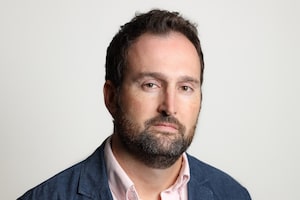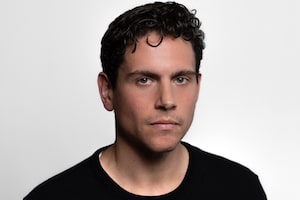
Chantel Moore’s uncle Joe Martin, pictured here speaking with media on June 15, 2020, says he’s hopeful Canadians are finally awakening to the racism experienced by Indigenous communities.jamie ross/The Globe and Mail
Two Indigenous families grieving separate police shootings met on a New Brunswick First Nation Monday, consoling each other while vowing to press for answers into the killings of their loved ones.
The deaths of Chantel Moore and Rodney Levi, killed eight days apart in the province, have exposed an ugly truth, their families say: that Indigenous people in Canada get a different standard of policing.
“This kind of a thing happens across the country. It must be said over and over and over again,” said Joe Martin, Ms. Moore’s uncle, who gathered with relatives at the house of Mary Anne Levi, Mr. Levi’s mother, followed by a meal at the band office.
“The pain we have felt is all across this country. ... We are of one heart. We [Indigenous people] are together."
Mr. Levi, a 48-year-old father of three from the Metepenagiag Mi’kmaq Nation in New Brunswick, was shot and killed by RCMP Friday night when police were called to a barbecue at a local pastor’s house. Ms. Moore, a 26-year-old mother of one, originally from the Tla-o-qui-aht First Nation in B.C., was killed by an Edmundston police officer conducting a wellness check on June 4.
Let’s just admit it: Canada has a racism problem
Quebec watchdog to investigate police shootings of Rodney Levi and Chantel Moore
The shootings come as Canada confronts questions around police brutality and the treatment of racialized people. Mr. Martin, who travelled to New Brunswick with about a dozen relatives from B.C., said he’s hopeful Canadians are finally awakening to the racism experienced by Indigenous communities.
The families were also joined Monday by relatives of Brady Francis, a 22-year-old from nearby Elsipogtog First Nation, who was struck and killed in a hit and run in 2018. The man accused of hitting him was found not guilty.
“This is the time for the native peoples to unite all across this county to stop this and ask why. Why are we viewed as villains?” Mr. Martin said.
Both shootings are being probed by investigators from Quebec’s Bureau des enquêtes indépendantes (BEI), called in because New Brunswick doesn’t have its own police oversight agency.
Prime Minister Justin Trudeau said Monday those investigations should be made public.
“My heart goes out to the families and loved ones of those who died. It is really important that they get answers – that we all get answers on what happened,” he said.
Questions are growing, meanwhile, about how police handled the early stages of the investigation into Ms. Moore’s death. Neighbours and Indigenous leaders say the woman’s body was moved shortly after she was shot, her clothing was removed and her family was prevented from examining her when they got there.
Investigators from the BEI didn’t arrive on the scene until about nine hours after Ms. Moore was killed – allowing a steady steam of local police in and out of her apartment before the area was secured by the outside agency.
“The Edmundston city police botched the investigation,” said Chief Ross Perley of the Tobique First Nation, one of six Wolastoqey First Nations in New Brunswick.
“The family came all the way from B.C., and they’re leaving tomorrow with no answers. It’s nothing but question marks around how their daughter died. That’s unacceptable."
A spokesperson for the Edmundston police declined to respond to questions about how the shooting was handled, citing the active BEI investigation. A spokesperson for the BEI did not respond to requests for comment.
The police version is that Ms. Moore confronted an officer with a knife when he arrived at her apartment. The Edmundston force has declined to say how many times Ms. Moore was shot.
Neighbours reported hearing five gunshots shortly after 2:30 a.m. Questions around Ms. Moore’s death are exactly why officers should be suited with body cameras, said Shayn Robichaud, who lives in the apartment below Ms. Moore’s. He said police were all over her apartment before Quebec investigators arrived and took over.
A family spokesperson told reporters the silhouette of Ms. Moore’s body was drawn inside her apartment, yet Ms. Moore appeared to have been shot outside, Mr. Robichaud said, because blood dripped down onto his back deck.
Mr. Robichaud also wonders how Ms. Moore, who he described as “petite” and around 5 foot 3, could intimidate a police officer. A few hours before she was killed, he’d gone upstairs to ask her to turn her music down – and found her to be very friendly and apologetic, he said.
"I can’t see her holding a knife and attacking a police officer. That’s not something I can see her doing,” he said.
The officer who shot Ms. Moore remains on paid leave. RCMP would not say what has happened to the officers involved in Mr. Levi’s shooting.
Indigenous leaders in New Brunswick say they’re frustrated by the lack of transparency in both cases and are skeptical the BEI investigation will ask tough question. None of the 167 investigations in Quebec where it was called in to probe serious injury or death of civilians by police has resulted in charges.
“This is police investigating the police, at the request of the police,” Mr. Perley said. “It has no transparency at all. There’s nothing independent about that. There’s no Indigenous oversight.”
The Wolastoqey Nation is calling for a broader inquiry into systemic racism faced by Indigenous people in the justice system, but it’s also frustrated that governments have been slow to act on already well-documented problems of discrimination.
“We’ve spent millions of dollars on all these inquiries and reports, we get all these recommendations and the federal and provincial governments do nothing,” Mr. Perley said. “And when you do nothing, you have instances like Chantel Moore and Rodney Levi. ... How many more people have to die?”
Bill Ward, chief of the Metepenagiag Mi’kmaq Nation, said Indigenous communities should have the right to be policed by Indigenous people. His reserve is hiring its own private security to watch the community, he said.
“The best people to police our people is ourselves. We know the history, we know what everyone is capable of and we can handle situations that arise," he said. "Give us fair and equitable funding, and opportunity and training to be able to train our people to do it safely.”
Grace Frank, Ms. Moore’s grandmother, said she’s hopeful that by uniting their voices, Indigenous people can begin to push for change.
“We want to put a stop to this. There is no need of killing our people. I feel this sadness in this community. Us standing together, we can be stronger. We all want justice,” she said.
Our Morning Update and Evening Update newsletters are written by Globe editors, giving you a concise summary of the day’s most important headlines. Sign up today.
 Greg Mercer
Greg Mercer Jamie Ross
Jamie Ross Marieke Walsh
Marieke Walsh